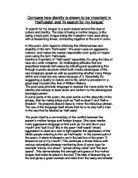The poet uses phonetic language to express the mans pride for his identity and refuses to back down and conform to the stereotypical (average) person.
In some parts of the poem, the poet points out the absurdity of the phrase, that he makes jokes such as “half-a-dream” and “half-a-shadow”. He presents absurd ideas to mirror the ridiculous phrase.
The use of the language itself shows that he is no way half a man in the way that he labeled as ‘half caste’.
The poem itself is a commentary of the conflict between the person’s mother tongue and foreign tongue. She uses nastier, more aggressive language at first such as “rot and die in your mouth” and “spit it out” like in the poem ‘half-caste” where aggression is used as a tool to fight against the oppression of the idiotic people referring to him as ‘half-caste’. In the second part of the poem, it starts to blossom, as in the last line of the poem “it blossoms out of my mouth”. This continues a flower theme with various naturalistic phrases mentioning flora of some type for example “stump of a shoot”, “grows strong veins” and “the bud opens”. This demonstrates the strength and grace of the mother tongue that holds its place in the end. This idea of blossoming at the end gives a great contrast and relief from the nasty and sinister battle between the two tongues and the two cultures.
‘Half-caste’ and ‘In search for my tongue’ share many ideas, including the largest one; identity. The identity is shown throughout on both.
The poem does not particularly have a form, he switches from English to slang words which are merged with his language. Throughout the poem, the ‘finger’ is constantly pointed at the reader, showing the strength of his identity, his race and his original language. The poet explores light-hearted quips of two famous people, Picasso and Tchaikovsky, turning his seriousness into a joke. The second half of the poem really focuses on the reader again, and a more aggressive approach to what seems to be so important to the poet; his identity.
‘In search for my tongue’ mimics ‘half-caste’ in many ways, this time the poem starts off aggressive and nasty, but ends more lightheartedly. The identity is stamped in the middle of poem with a breakout of the mother tongue in a dream, this shows the reader that the poets passion, strength and identity flourishes. Once again the mother tongue succeeds and beautifully describes its victory, this victory shows the importance that identity has to the poet.







